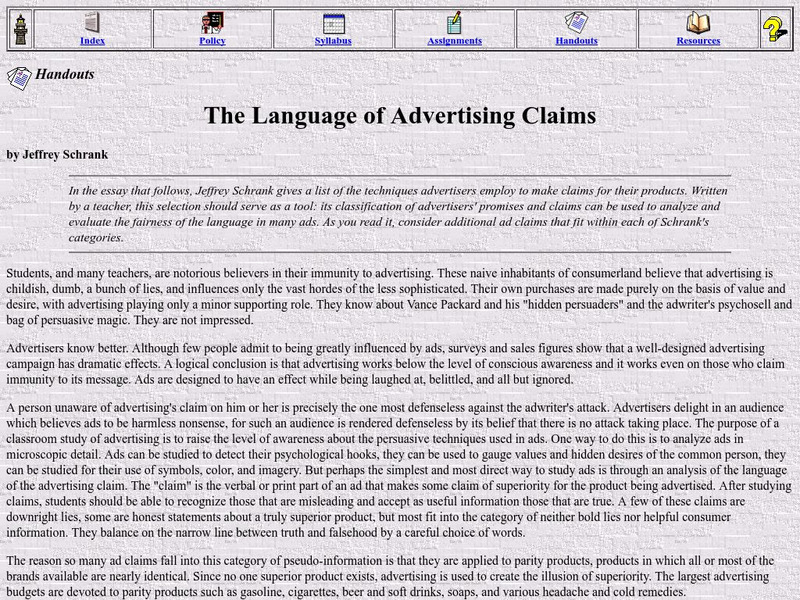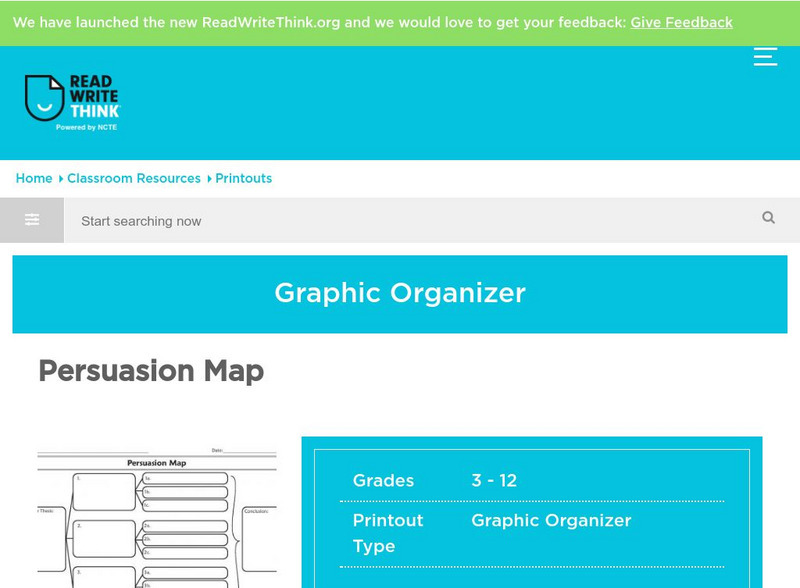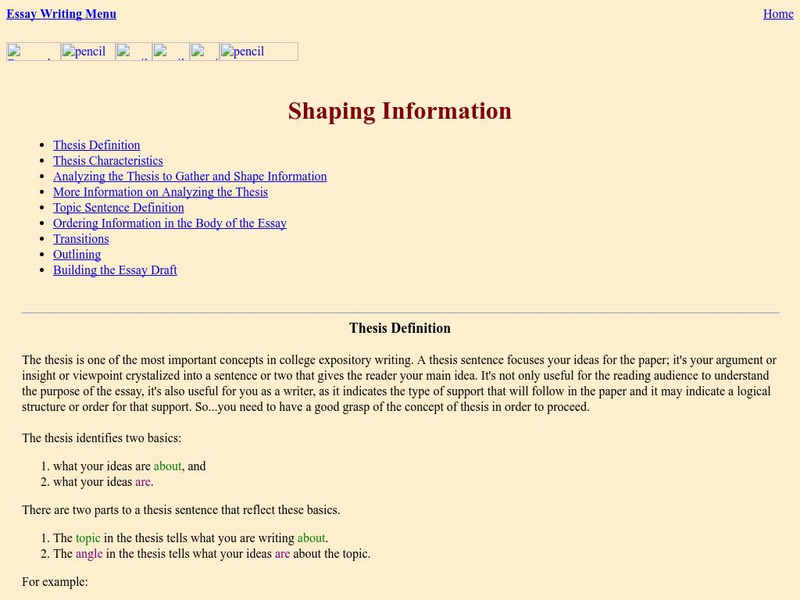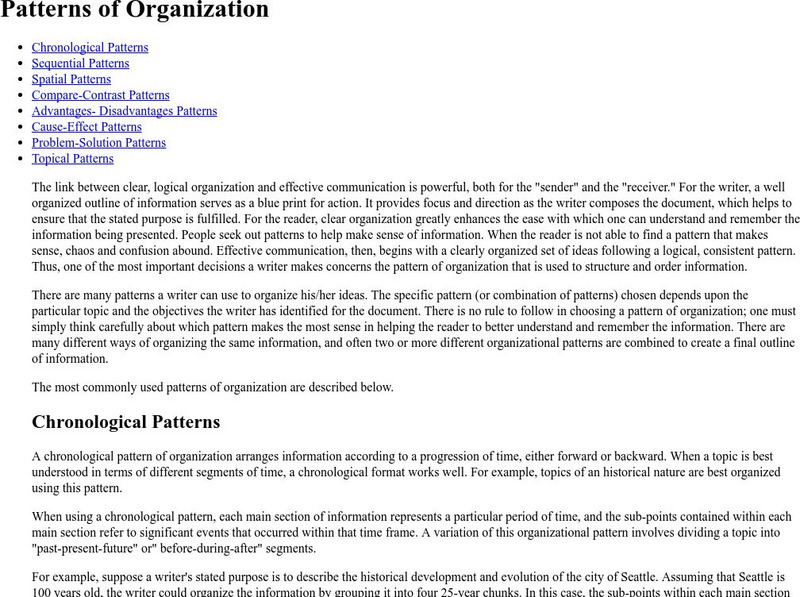iCivics
Drafting Board: Interest Groups
Does the influence of interest groups harm a political system? Your class members will analyze the role of interest groups in American politics, as well as consider the effect of perspective, bias, loyalty, and the...
North Carolina School of Science and Mathematics
Henry Kissinger and Detente
How did relations between the United States and the People's Republic of China evolve between 1950 and 1970? Your young historians will complete a timeline of events with evidence that the relationship between these two great...
Curated OER
Did Napoleon Uphold or Betray the Goals of the Revolution?
Walk your learners through constructing a well-formulated argument on Napoleon's dedication to the goals of the French Revolution.
Federal Reserve Bank
Constitutionality of a Central Bank
Considering the expressed and implied powers of Congress, was it constitutional for the United States to establish the Second National Bank in the early nineteenth century? What is the constitutionality of the Federal Reserve...
Federal Reserve Bank
The Fed’s Toolbox
This lesson is packed with instructional material and activities on the Federal Reserve System, monetary policy, and the relationship between bank reserves, interest rates, employment, and price stability.
Federal Reserve Bank
Government Spending and Taxes
What types of government programs are designed to improve economic inequity in the United States? Introduce your learners to government programs, such as low-income housing, Social Security, and Medicaid, how they work to improve...
University of Chicago
Comparing Modern and Ancient Ideas of Ethnicity and Identity
Explore ethnicity and identity with a research and writing assignment. Class members conduct online research, looking in particular at images and carefully noting down their sources on notecards. They read about identity and compose...
Teacher Web
1920's Magazine
What a creative and engaging project to incorporate into your studies of the 1920s! Your young historians will work in groups to design a magazine discussing the political and cultural topics of the decade, each member writing one...
American Documentary
Religion in Culture & Politics: Women’s empowerment in Syria
What defines a woman as empowered, and how does this definition compare to the ideas and actions of a group of Muslim women in Syria? After watching a series of video clips from a documentary film about a school for girls in Damascus,...
Howard Hughes Medical Institute
Color Variation over Time in Rock Pocket Mouse Populations
A species-specific look at natural selection, the resource herein examines how adaptations have helped the population of rock pocket mice survive in a changing landscape. To begin, middle or high schoolers watch a 10.5 minute video,...
National Endowment for the Humanities
Lesson 2: Religion and the Argument for American Independence
Young scholars examine how religion affected arguments justifying American independence. They read and analyze primary source documents, and write an essay analyzing how Americans used religious arguments to justify revolution against a...
National Endowment for the Humanities
Lesson 1: The First Great Awakening
High schoolers examine the First Great Awakening and how it affected religious belief in colonial America. They read and analyze primary source documents, explore various websites, and write a five-paragraph essay examining the beliefs...
Curated OER
Centers of the Storm: The Lyceum and the Circle at the University of Mississippi
Greek Revival architecture and the Civil Rights Movement? Sure! Examine how the Lyceum and Circle, two historic buildings located on the campus of the University of Mississippi, relate to integration and the 1962 riot on the university...
National Endowment for the Humanities
The Debate in the United States over the League of Nations: Five Camps: From Voices of Consent to Voices of Dissent
Learners explore and discuss Woodrow Wilson's concepts for peace and the League of Nations. They understand efforts made to foster American support for the League and discuss the opposition shown in the Senate.
National Endowment for the Humanities
Slavery and the American Founding: The "Inconsistency Not to Be Excused"
High schoolers examine slavery in the revolutionary and colonial eras of the United States. In this slavery lesson, students investigate the presence of slavery in early America, the language of the Constitution, and the intent of the...
National Endowment for the Humanities
Lesson 3: Religion and the Fight for American Independence
Pupils explore the role religion played in the American Revolutionary War. Using primary documents and writing exercises, students understand how religion was used in support of the war efforts and how specific religious groups responded...
National Endowment for the Humanities
Lesson 2: The Debate in Congress on the Sedition Act
Pupils research and discuss the provisions in the Constitution that supported the arguments for and against the Sedition Act. They articulate objections to and arguments in favor of the Sedition Act.
National Endowment for the Humanities
Chinua Achebe's Things Fall Apart: Oral and Literary Strategies
Readers are first introduced to Chinua Achebe's Things Fall Apart by making a map of Africa. They will better understand the novel's historical and literary contexts, European and African literary traditions, and how...
Georgia Department of Education
Ga Virtual Learning: The Rhetorical Organization of Neoclassical Couplet [Pdf]
This a two-page PDF of the article "The Rhetorical Organization of the Neoclassical Couplet."
Other
Univ. Of Mississippi: The Language of Advertising Claims
Univ. of Mississippi essay outlining the various claims made by advertising and including lots of examples. The author also addresses the mistaken ideas that many students and teachers have about their own immunity to advertising.
ReadWriteThink
Read Write Think: Persuasion Map
A printable graphic organizer for students to use when writing on opinion or persuasive essay. Directions on how to use this type of graphic organizer as well as lists of teaching ideas, lesson plans, and other resources are also...
SUNY Empire State College
Empire State College: Thesis and Shaping Information
This tutorial on writing essays contains several sections pertaining to the thesis. These include thesis definition, characteristics, analysis of thesis to gather and shape information, and topic sentences. Many examples given. W.9-10.2...
University of Washington
University of Washington: Patterns of Organization
In addition to defining and describing various patterns of text organization, this website provides outlines illustrating each pattern. RI.11-12.3 Text development
Other
International Debate Education Association: Debates: Politics
A selection of debate topics focused on political themes. Each topic includes a clear statement of the argument, a list of points for and against, suggested support for each (point and counterpoint), and a bibliography that supports the...





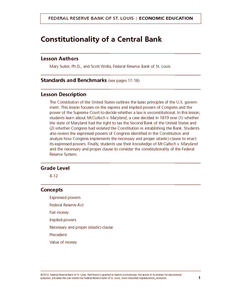






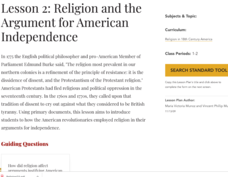







![Ga Virtual Learning: The Rhetorical Organization of Neoclassical Couplet [Pdf] Primary Ga Virtual Learning: The Rhetorical Organization of Neoclassical Couplet [Pdf] Primary](https://d15y2dacu3jp90.cloudfront.net/images/attachment_defaults/resource/large/FPO-knovation.png)
